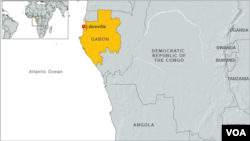Gabon’s courts are effectively closed because the magistrates who run them refuse to work due to what they call poor working conditions and pay. They have rejected pleas by leaders to return to work while waiting for conditions to improve.
Civilians say hundreds of people seeking justice have been turned away from the courts for close to a month now.
Courts in Gabon traditionally handle cases that include land disputes, marriage disputes, divorce, labor disputes, inheritance and criminal offenses. The courts also authenticate documents and establish certificates of nonconviction for civilians who want to get national identity cards or run for public office.
Shopkeeper Narcisse Eboko said he visited the court at the administrative center in Gabon's capital, Libreville, five times within the past 10 days to apply for a certificate of nonconviction, but no one has attended to him.
Eboko is surprised that the government is allowing courts, which ensure the protection of human rights and freedoms, to be paralyzed for so long, he told VOA via a messaging app from Libreville on Tuesday.
Magistrates in Gabon launched their protests on Jan. 13, saying that they want an immediate application of the general status of their profession, which gives financial and material advantages to guarantee their independence. It is very difficult for magistrates to make fair decisions based on the law without adequate remuneration as stated in Gabon's laws, the magistrates say.
Gabon's National Trade Union of Magistrates, or SYNAMAG, said it is surprised there has been no concrete response from the central African state’s government on if there are plans to improve the magistrates’ working conditions.
SYNAMAG President Landry Abaga Essono said the union launched protests because Gabon's government refused to improve working conditions of magistrates and declined calls for dialogue.
He said the protests will continue until the government improves working conditions.
SYNAMAG also blamed the government for failing to improve the functioning of understaffed courts with dilapidated infrastructure, especially in Libreville, Mouila, Port-Gentil, Makokou and Franceville.
Justice Minister Paul Marie Gondjout defended the government, saying it is not reluctant to solve the problems and is concerned about the plight of the magistrates and other court workers. He cited a new court building in Ntoum as proof.
The country’s financial difficulties make it impossible to raise the $40 million needed to immediately solve the problems presented by the magistrates, Gondjout said on state TV Monday. The government is, however, looking for a way to satisfy some urgent needs of magistrates, he said.
Essono did not agree, saying Gabon does not lack the financial means to improve working conditions in a sector as important and sensitive as justice, especially when the courts will be highly important during presidential elections in two months. The vote is expected to end a military transition that began with a coup on Aug. 30, 2023.
Essono also pointed out that the government had the resources to increase job benefits for government troops only a few months ago.
The magistrates say they have petitioned Gabon's transitional president, General Brice Clotaire Oligui Nguema, to immediately order his government to improve their living conditions. VOA could not verify whether Nguema had received the request.
SYNAMAG said it is calling on citizens to be patient, saying that the protest is necessary to improve the delivery of justice.




